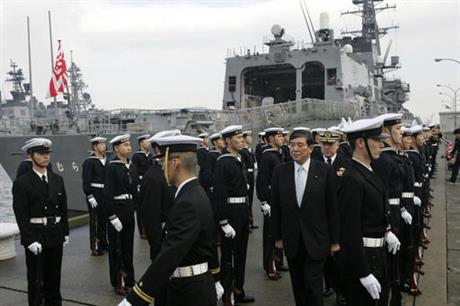- California Assembly OKs highest minimum wage in nation
- S. Korea unveils first graphic cigarette warnings
- US joins with South Korea, Japan in bid to deter North Korea
- LPGA golfer Chun In-gee finally back in action
- S. Korea won’t be top seed in final World Cup qualification round
- US men’s soccer misses 2nd straight Olympics
- US back on track in qualifying with 4-0 win over Guatemala
- High-intensity workout injuries spawn cottage industry
- CDC expands range of Zika mosquitoes into parts of Northeast
- Who knew? ‘The Walking Dead’ is helping families connect
Japan defense adviser sees chance to update alliance with US
TOKYO (AP) — A top defense policy adviser for Japan’s government on Monday proposed using U.S. President-elect Donald Trump’s demand that Tokyo contribute more to its own defense as a chance to update the countries’ security alliance to reflect Japan’s greater military capability and today’s harsher security environment. 
Former Defense Minister Shigeru Ishiba, a leading candidate to become Japan’s next prime minister, said Tokyo contributes more financially for the basing of American troops than any other U.S. ally, but perhaps less militarily.
Ishiba’s comment comes amid concerns in Japan that Trump might demand that Tokyo pay more for the 50,000 American troops stationed in Japan under a bilateral security treaty. Japan pays about $2 billion a year, about half of the non-personnel costs of stationing the U.S. troops, while South Korea pays about $860 million a year for about 28,000 American troops based there.
Japan’s pacifist constitution, written under U.S. direction after World War II, prohibits it from using force in settling international disputes. The security treaty requires the U.S. to help Japan if it is attacked and allows the U.S. to maintain military bases in Japan. Many military analysts say the U.S. benefits from having the forward-deployed bases in Japan and elsewhere in Asia.
“In the future, this structure should change,” Ishiba said at a news conference in Tokyo, citing the development of Japanese military capability and changes in the regional security environment, including China’s growing assertiveness and North Korea’s nuclear program, since the security alliance was formed about 60 years ago.
In those days, Washington’s main interest was in having unrestricted use of military bases in Japan, not in having Japan help defend Americans, Ishiba said. He said Japan has become a more equal partner since then, and that it can take on some of the roles currently performed by the U.S. military.
Prime Minister Shinzo Abe has urged an expanded role for Japan’s military in areas such as international peacekeeping, and eventually hopes to rewrite the pacifist constitution. Many in Japan oppose such constitutional amendments.
For the first time since World War II, Japanese peacekeepers arrived in South Sudan on Monday with a mandate allowing them to use force to protect civilians. The expanded mandate was approved by Japan’s parliament last year despite opposition from some Japanese who feared that it could entangle the country’s military in an overseas conflict and violates the anti-war constitution.
Ishiba said he met with retired U.S. Lt. Gen. Michael Flynn, whom Trump has selected as national security adviser, when Flynn visited Tokyo in October, and discussed the bilateral alliance and other issues over dinner for about three hours.
“He has a very accurate understanding of the importance of the Japan-U.S. alliance,” he said of Flynn. “However, it doesn’t mean the Japan-U.S. alliance should stay the way it is right now, and we agreed upon that point as well.”
Ishiba said the alliance with the U.S. is “indispensable” to Japanese security policy and it is important to continue building “mutual trust and reciprocity.”












kelly
November 22, 2017 at 4:47 PM
Very nice and always successful.
This is a very good article.
I’m waiting for you the other article.
togel online